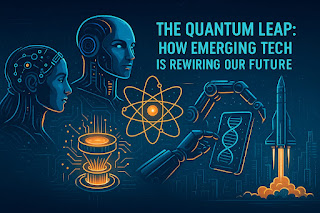Read more
"The Quantum Leap: How Emerging Tech Is Rewiring Our Future"
Introduction: We are living in a transformative era where exponential technological growth is not only reshaping industries but redefining how we live, communicate, and even think. From AI and quantum computing to neural interfaces and sustainable energy tech, the world is evolving at a pace that once belonged to science fiction. This blog explores the most exciting and game-changing new technologies shaping our world, and what lies ahead.
https://wristworthyhub.blogspot.com/2025/06/the-timekeepers-paradox.html
---
1. Artificial Intelligence: The Brain Behind the Revolution
Artificial Intelligence has transformed from a buzzword to a pillar of innovation. From giant language models such as ChatGPT to AI-enabled healthcare diagnostics, AI is making industries more efficient and opening up new avenues. In 2024 alone, AI enabled drug discovery breakthroughs, climate modeling advancements, and personalized education.
Example: IBM's WatsonX identified early Parkinson's symptoms by analyzing vocal patterns.
Impact: Automation of repetitive tasks, predictive analytics in finance, and conversational AI in customer service.
AI is also the foundation of autonomous vehicles, virtual assistants, and smart homes. However, as AI grows, so do questions of ethics, privacy, and transparency.
---
2. Quantum Computing: Cracking the Code of the Universe
Quantum computers stand ready to tackle problems that classical computers can't. In 2025, IBM's Quantum Heron reached a milestone by executing 100 qubits with noise mitigation. Modeling molecules, supply chain optimization, and breaking encryption might become everyday jobs.
Real-world effect: Quantum AI for climate modeling, cryptography, and pharmaceutical modeling.
Main Players: IBM, Google, Rigetti, IonQ, and startups such as Xanadu.
Though practical uses remain several years off, the prospect of quantum supremacy is nearer than ever.
---
3. Brain-Computer Interfaces (BCIs): Blending Mind and Machine
Neuralink and other BCI pioneers are connecting mind and machine. In late 2024, Neuralink's initial human implant enabled a paralyzed man to control a cursor on a screen with mere thoughts.
Advantages: Helping the disabled, improving memory, and possibly opening up telepathic communication.
Disadvantages: Invasive techniques, invasion of thoughts, and ethical issues.
BCIs may bring a time when man and machine think together, but regulation and safety will be essential.
---
4. Breakthroughs in Renewable Energy and Fusion
The transition to green energy has accelerated with the developments in fusion power. In December 2024, France's ITER project realized net energy gain with a Tokamak reactor.
Other major breakthroughs:
Efficient Perovskite solar cells at 30% efficiency
Graphene and solid-state lithium battery storage
Vertical urban wind turbines
Smart grids and AI-based energy forecasting are maximizing the use of power and making renewable energy more dependable than ever.
5. Space Tech: The New Gold Rush Beyond Earth
SpaceX, Blue Origin, and new space startups are changing exploration and commerce.
Highlights of 2025:
SpaceX's Starship made its first orbital cargo flight
NASA's Artemis II took humans closer to the Moon's surface than ever before
China's Tiangong Space Station concluded Phase 2
Satellite internet, asteroid mining, and Mars trips are no longer visions—they're part of tomorrow's economy.
---
6. Extended Reality (XR): The Metaverse Evolves
The Metaverse has grown from its hyperbolized origins to become a more functional canvas for work, education, and recreation. Apple Vision Pro, Meta Quest 4, and Microsoft Mesh are delivering hyper-realistic experiences.
Use Cases:
VR classrooms and corporate meetings
Virtual tourism and remote real estate tours
Training simulations for surgeons, pilots, and engineers
Extended Reality is combining the digital and physical worlds, redefining how we experience presence, emotion, and connection.
---
7. Smart Cities: The Emergence of Intelligent Infrastructure
Dubai, Singapore, and Helsinki are all adopting smart systems. With sensors, AI, and IoT, these cities are optimizing transportation, lowering energy consumption, and enhancing emergency response.
Technologies driving smart cities:
Self-driving public transport
Traffic control powered by AI
Predictive maintenance-enabled smart buildings
Governments are spending billions on smart infrastructure, seeking to meet technology with sustainability and livability.
---
8. Biotechnology: Editing Life Itself
CRISPR technology continues to revolution genetics. In 2025, gene-editing technology such as CRISPR 3.0 is employed to treat genetic diseases such as cystic fibrosis and sickle cell disease.
Synthetic biology produces lab-created meat, personalized bacteria to scrub pollution, and biofuels.
Wearable biosensors currently give real-time metabolic information, even forecasting diseases before they occur.
Biotech is providing the power to control biology at the molecular scale—eliciting optimism and multifaceted ethical concerns.
---
9. Autonomous Systems and Robotics
Autonomous vehicles are moving toward mass adoption. Waymo extended driverless ride-hailing service in 2025 around Phoenix and San Francisco, while Tesla launched FSD v13 with better city driving.
Industrial robots are already doing sophisticated assembly and logistics operations.
Service robots in South Korea and Japan are helping the elderly, while robotic janitors and chefs are on the rise.
With increasing autonomy, sectors ranging from agriculture to defense are getting transformed.
---
10. Cybersecurity in the Age of Everything-Connected
With great connectivity, there is greater danger. AI-based cyberattacks, deepfake phishing, and vulnerabilities in IoT are threats of the future.
Top cybersecurity trends (2025):
Quantum-safe encryption
Zero-trust frameworks
AI threat detection and auto-response
https://wristworthyhub.blogspot.com/2025/05/neuroverse-code-that-dreamed.html
Cybersecurity is no longer merely defense; it's a vital layer of digital trust on which businesses and governments depend.
---
Conclusion: What's Next?
We stand at the threshold of an unprecedented technological revolution. The melding of AI, quantum computing, biotech, and space exploration is not only speeding up change—it's accelerating it exponentially. While this opens up boundless opportunity, it also requires responsibility, regulation, and inclusivity.
As we enter this future, the question isn't merely "What can we build?" but "What should we build—and for whom?"








0 Reviews